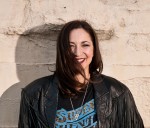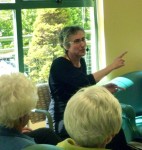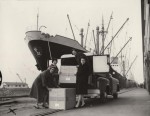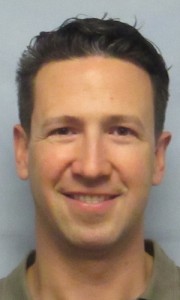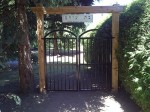Gena Perala plays at Harmony Arts Festival on Aug. 3. (photo from Gena Perala)
“Creating songs, writing music and poetry, is its own reward,” said Gena Perala. The young poet and songwriter is still striving to find her niche in the Vancouver poetic community but she knows exactly who she is. “I’m a creative, an artist. I love words,” she said in an interview with the Independent. “I started performing my poems in the Vancouver Poetry Slam but I love music, too. Sometimes, I just write music or sing but I consider myself a writer first.”
Her artistic life began in touring carnivals. “My parents were carnies. My dad ran a bunch of games on the carnival circuit. He traveled year round, only sometimes coming home. My mom, with the kids, stayed home in White Rock during the school years and then, every summer, we would join the carnival and travel with my father. I loved it. There were people from all walks of life and all nations in the carnival. I was exposed to many cultures.”
She is mostly self-taught. “I took some lessons in piano, guitar and voice but, for my poetry, I read a lot. I read classics. I read lots of Russian literature.… You can’t really ‘teach’ writing poetry. There is no formula. I facilitate poetry workshops in high school; have been doing it for the last few years. I’m trying to show teenagers how to express themselves poetically. Of course, there is some structure, some poetic devices, but there are so many ways to write poetry. I help students to access those ways.”
She also leads poetry seminars for young offenders. “A teacher who knew me from my high school poetry workshops asked me to do the same at a correctional facility for teenagers, ages 13 to 17. It’s the same process, and the kids are like any other kids, they just lacked some love in their lives. During the workshops, I try to let them know that they’re valuable, that their thoughts and ideas are interesting.”
Not surprisingly, her poetry often slants towards social themes. A few years ago, she participated in a B.C. poetry competition about the importance of voting – and won it. “I think it’s important to vote,” she said, “especially for us, women. We have only been allowed to vote for the past hundred years or so. We should exercise that right.”
Going from writing and reciting poetry to writing and performing songs was a small and logical leap. While the activity itself is highly rewarding, however, it’s not a lucrative career. “I make money by waitressing,” Perala said with a laugh. “With my songs and poetry, I’m lucky if I break even.”
Lately, she has been touring, and that has helped financially. “I’ve had several tours recently, after I released my album Exactly Nowhere. I performed in Toronto, New York and on the West Coast. Touring is very reassuring for me. When I tour, I’m usually the feature of a concert. I sell out my discs. I connect with people. My songs resonate with them. They come to me after the shows and we talk. Once, I met a group of surfers, young guys, in California. They loved my songs. But, in Vancouver, it’s hard to get exposure. It’s a tough town to get shows here. It’s probably the hardest challenge.”
Perala keeps trying, and she is constantly learning new skills. One of the most fascinating projects for her was the making of her first music video, Living Proof. She expounded on its creation: “I hired a bunch of professionals to help me, but the vision was mine. I wanted to be floating, but to film that would be terribly expensive. The director, Blake Farber, suggested we use a fan and some scarves and ribbons. It came out very well. And I have tons of other ideas. As soon as I scrounge some money….” She smiled. “Fortunately, my fan base is growing.”
Locals might see her this summer playing piano around Vancouver as part of the Keys to the Streets project. “I first learned about a similar project, Street Piano, when I lived in New York,” she said. “They installed 60 pianos in the streets during the summer, and anyone who wanted to play could. It was one of the best experiences of my life. I was walking down a street and, suddenly, there was a piano and a guy was playing it. I stopped and listened. Later, we talked. He was a professional pianist in the past but hadn’t played for awhile; he didn’t have an instrument at home. I didn’t either, so I played it, too.
“Vancouver started a similar project – put 10 pianos in the streets during July and August. I played one last year. I have a keyboard at home now, but that was a real piano. I’m going to do it this year, too. You always meet people there. Some listen, others play. I love people.”
Perala’s next performance will be at the Harmony Arts Festival on Aug. 3, 3 p.m., at Millennium Park in West Vancouver (harmonyarts.ca/gena-perala). To learn more about Perala and her work, visit genaperala.com.
Olga Livshin is a Vancouver freelance writer. She can be reached at olgagodim@gmail.com.

